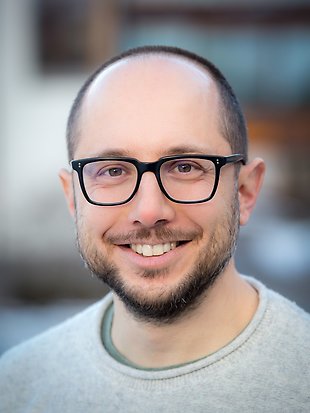Reseracher profile: Fabien Burki

Imagine you are looking at an environment and you find a cell (that is an organism made of just one cell) that seems to be the key evolutionary link to understanding how very ancient events led to the great diversity of life we observe today. You want to find out everything about this cell, how it looks, where it came from, what secrets lie in its genome. These are the kinds of questions that Fabien Burki wants to answer in order to understand some of the major transitions in life, for example the acquisitions of the capacity to use the light to produce energy, or the transition from free living to parasitic lifestyles.
Contact
Fabien works at Systematic Biology in the Department of Organismal Biology, Uppsala University and studies protists at large. Protists are basically everything that are not animals, fungi, or land plants but are complex enough to have a nucleus. For example, the classical high-school microscope demo organism, Amoeba proteus, is a protist. But protists in fact make up the vast majority of the diversity of eukaryotes (cells with nucleus), and so comprise a hard-to-grasp variety of forms and lifestyles, from nasty parasites like Toxoplasma gondii (which causes the disease toxoplasmosis) to peaceful planktonic species which, when blooming, can be seen from space. “It is amazing to see things that seem like they are related, but in fact are not and are placed on opposite branches in the tree of life” Fabien says. “If one wants to understand how eukaryotes have evolved, there is no way around it we have to look at the great unknown diversity of protists”.
The road to becoming a scientist wasn’t always obvious for Fabien. Both his parents were scientists, so he quickly developed an interest in science. He was very interested in meteorology and physics, but felt that these fields required too much hard-core mathematics (not his cup of tea), so he started studying biology at university instead. There he met Professor Jan Pawlowski, who studied protists, and a whole new world of diversity opened up to him.
“I’m still amazed that we haven’t integrated it more in education. Very little about protists is currently taught even here at Uppsala University, yet from an evolutionary broad perspective, things like animals are just a detail on the tree of life”, he continues.
Developing new lines of research is something Fabien is passionate about. Since his debut in his current position, he has started investigating an enigmatic group of parasites that infects marine invertebrates like oysters and mussels. “There has been very little research about lineages of parasites that are not pathogens of human or crops, despite the fact that they can have a large impact on human activities. For instance, these parasites we are studying almost wiped out entire shellfish aquaculture in some regions, yet not even one genome is available for the entire group when tens of genomes are available for a single species of the malaria agent (Plasmodium)”, Fabien says. “If you are like me and like a good platter of oysters, this can’t be good” he says laughingly.
Fabien’s long-term dream is to be able to look at everything in various environments and identify all missing evolutionary links. These cells are then sequenced, their biology studied and their lifestyles mapped back on the tree.
“It would be a huge step forward, and the best way to go beyond the textbook generalities of what cells can do”, Fabien notes.
“There is just so much to explore and discover,” he says.
When Fabien is not working, he spends time with his family. Although lately there seem to have been very little time for his 2 passions, when he can he goes out to take photographs, or on the water to windsurf.
When asked what advice he has for anyone interested in pursuing a career in science, his main advice is not to be afraid of changes.
“You will wind up where the research in your field of interest happens. Don’t be afraid to explore different opportunities and once you know what truly excites you, go with that. You will likely have to move around to different places” he says, “but these are great opportunities to discover different cultures and societies”.
As to why Fabien chose Uppsala, it was mainly because it was one of the few places in the world where molecular systematic research is performed, and the research environment in Uppsala allows him to develop all he wants. “Imagination is the limit here (and money, like everywhere else)”. He also felt that Sweden was a good place to bring his family and that it was close to his home country (Switzerland).
“Moving here was not easy, but now we have everything settled and are really enjoying things”, he says.
Facts Fabien Burki
Likes: Cheese and wine
Dislikes: Cardamom and phone calls.
